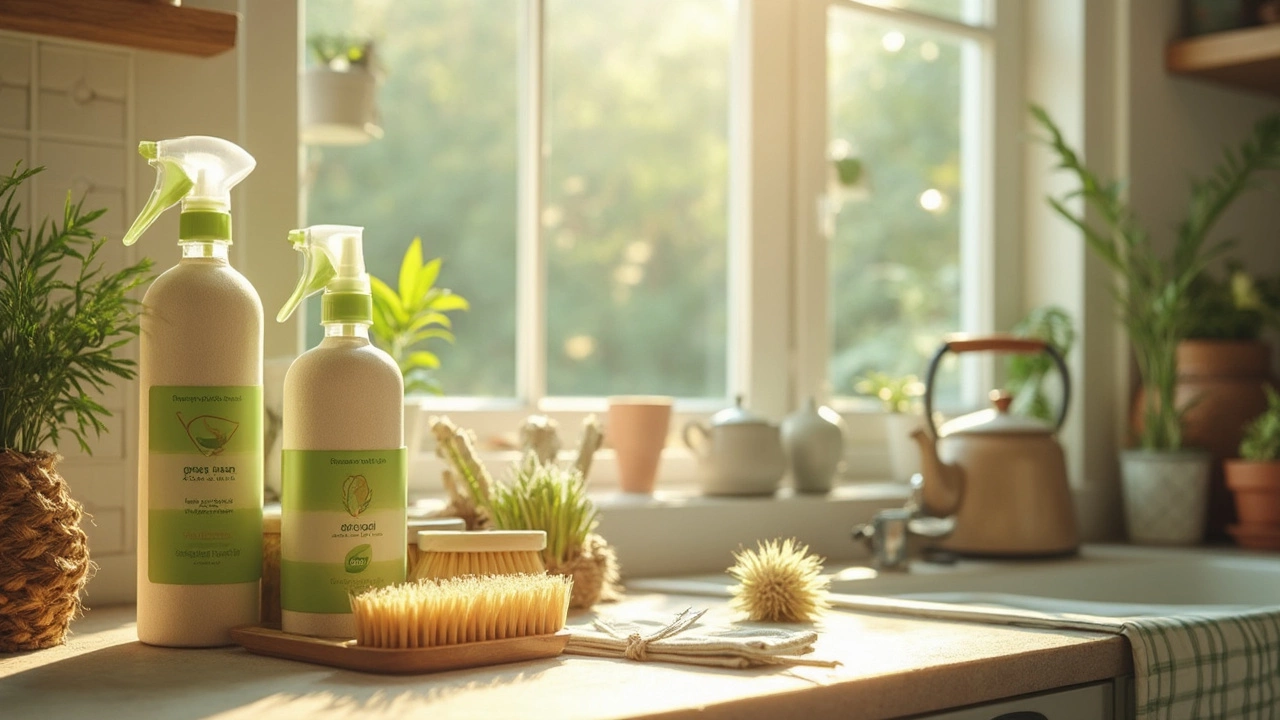Have you ever looked at the sea of brightly colored cleaning bottles in your cupboard and wondered if they're doing more harm than good? You're not alone. More of us are on the hunt for cleaning products that don't just promise a sparkling home but also come with a green heart. It’s not just about getting rid of the dirt anymore; it’s about doing it sustainably.
In recent years, environmentally friendly cleaning has boomed. But with so many brands waving the green flag, how do you know which one is the real deal? Some companies really do walk the walk with earth-friendly ingredients and sustainable practices while others might be just, well, greenwashing.
Brands like Method, Ecover, and Seventh Generation have pulled ahead, flaunting certifications and endorsements that make them stand out. But it’s not just about labels and logos. We’re going to dig into what truly makes these brands eco-friendly—think renewable ingredients, biodegradable packaging, and ethical manufacturing.
And for those thinking of making the switch, we'll throw in some nifty tips to choose products that genuinely fit your eco-conscious lifestyle. Ready to take your cleaning green?
- Setting the Scene: The Rise of Green Cleaning
- Top Eco-Friendly Cleaning Brands
- What Makes a Brand Truly Green?
- Practical Tips for Choosing Eco-Friendly Products
Setting the Scene: The Rise of Green Cleaning
Once upon a time, cleaning products were all about efficiency. We wanted sparkly countertops and pristine floors, even if it meant using harsh chemicals. Then, somewhere along the way, folks started to notice something was off. Concerns grew about what these chemicals were doing to our health and the planet. Cue the entry of eco-friendly cleaning products.
The rise of green cleaning is not just a trend; it's a movement, fueled by awareness about environmental issues. People are waking up to climate change, pollution, and the impact of their everyday actions. This shift in mindset pushed household cleaning products to evolve.
Consider this: the global green cleaning products market was valued at over $3 billion in 2023, and it’s growing at a solid pace. This isn’t just because more people are buying green products for themselves; offices, schools, and hotels are joining the eco-friendly bandwagon too. They’re making sure every scrub and polish counts toward a cleaner planet.
So, what's pushing this growth? First, you’ve got the increasing availability of sustainable cleaning solutions. They're no longer niche or hard to find. Next, enter eco-conscious celebrities and influencers, making them cool and trendy. And finally, let’s not forget the power of information—more research is showing us the long-term effects of using traditional, chemical-laden products versus the benefits of making the switch.
- Methods and contents of products are increasingly transparent. More companies now disclose the full list of ingredients, respecting consumers' right to know.
- Packaging has seen a change too. Brands are now using recycled materials, or even better, offer refill stations to cut down on waste.
- There's been a rise in plant-based formulations, replacing synthetic chemicals. Think of cleaners made from essential oils, naturally derived surfactants, and friendly enzymes.
The green cleaning movement isn’t just cleaning floors and surfaces; it’s sweeping through the cleanliness industry, encouraging something bigger—sustainable living. And honestly, isn’t a clean house that doesn’t harm the environment the dream?
Top Eco-Friendly Cleaning Brands
If you've been hunting for the perfect eco-friendly cleaning brands, a few superstar names pop up constantly. Among the frontrunners, Method, Ecover, and Seventh Generation have gained quite the reputation. But what makes them tick?
Method is a funky, colorful brand that's serious about being green. Their products are not only 100% cruelty-free but also crafted in renewable energy-powered factories. Method bottles are made from 100% recycled plastic, which feels like a small but mighty win for the planet. Plus, their fragrances are derived from nature, leaving your home fresh without a chemical cloud.
Meanwhile, Ecover originates from Belgium and has been pioneering eco-friendly solutions since 1979—long before it was cool. They focus on plant-based ingredients that are kind to your hands and the waterways they eventually return to. Ecover’s factories boast zero-waste policies, proving that sustainability runs deep in their operations.
Then there’s Seventh Generation, which prides itself on being transparent and focusing on renewable, plant-based ingredients to get the cleaning job done. Their commitment to sustainability is evident in their support for climate initiatives and open ingredient disclosure. Interestingly, Seventh Generation challenges us to consider the impact of their current decisions on the next seven generations, giving a whole new meaning to planning ahead.
Here’s a snapshot of why these brands tend to stand out in the sustainable cleaning market:
| Brand | Unique Eco-Friendly Practices |
|---|---|
| Method | Bottles made from 100% recycled plastic, cruelty-free products |
| Ecover | Zero-waste factories, plant-based ingredients |
| Seventh Generation | Open ingredient disclosure, supports climate initiatives |
These brands top the charts not just for their green credentials but also for proving that effective cleaning doesn't have to come at the environment's expense. Their innovations and dedication to the planet make them tough to beat in the world of environmentally friendly cleaners.

What Makes a Brand Truly Green?
So, you're wondering, what really makes a cleaning brand eco-friendly? Well, there are a few key factors that separate the real green warriors from the pretenders.
First up, ingredient transparency is huge. A truly green brand will openly list what’s inside their products. Instead of the usual cocktail of chemicals, you should be seeing natural ingredients like plant-based cleaners and essential oils. They're not just better for the Earth; they’re often kinder to your skin and safer to inhale.
Packaging also tells a story. Eco-friendly brands take packaging seriously by using recycled materials and cutting down on plastic. Refill systems are awesome because they reduce waste. Imagine dropping a new bottle into the bin every time you run out—doesn't make much sense, does it?
Certifications are sort of like the scout badges of the eco-friendly cleaning world. Look for labels from organizations like EcoCert, or certifications that products are cruelty-free and vegan. These badges show that a brand has met high environmental and ethical standards.
Sustainability isn't just about ingredients and packaging though. It's about what happens behind the scenes. Brands like Method and Seventh Generation often get high marks because they work to reduce their carbon footprints by using renewable energy in their factories and maintaining ethical supply chains.
Finally, consider yourself. How does a brand engage with its customers? Do they educate on sustainability or just focus on selling? A brand that invests in customer education about sustainability and cleaning tips is investing in a greener future.
Let’s put it this way: if a brand is as dedicated to the environment as they are to making your home clean, they’re onto something good.
Practical Tips for Choosing Eco-Friendly Products
So you're ready to ditch those chemical-laden cleaners for some eco-friendly cleaning vibes? Awesome! But wait, it can be a bit of a jungle out there with all the options and the buzzwords. Here are some down-to-earth tips to help you pick the real green stuff.
First, grab that bottle and check the ingredient list. Sure, you won’t recognize every single scientific name, but keep an eye out for common nasties like phosphates and synthetic fragrances. Look for natural ingredients like plant-based alcohols and essential oils instead.
Next up, certifications. These are like treasure maps leading you to the good stuff. Keep an eye out for labels like USDA Organic, Ecocert, or the EU Ecolabel. These badges mean the product has been vetted by someone other than the brand itself and you're not being greenwashed.
Packaging matters, too. Opt for brands that offer recyclable or biodegradable containers. Some companies have even started using refill stations, so you reduce the waste from single-use plastics.
Don't forget, buying local can also reduce your carbon footprint. Products made closer to home don’t have to travel as far, cutting down on transport emissions. Plus, you’re supporting your local economy.
- Check if the company has a sustainability report. This often sheds light on everything from sourcing practices to energy use.
- Tap into online reviews. Other eco-enthusiasts out there might point you toward genuine finds or warn you off misleading ones.
- Try a minimalist approach. Instead of stuffing your cupboards, go for multipurpose cleaners. A bottle that cleans glass, tiles, and counters saves money and reduces waste.
When you start diving into the world of sustainable cleaning, these tips will light the way. You’ll soon be a pro at spotting the real heroes of green cleaning brands. Cheers to being kind to the planet!
